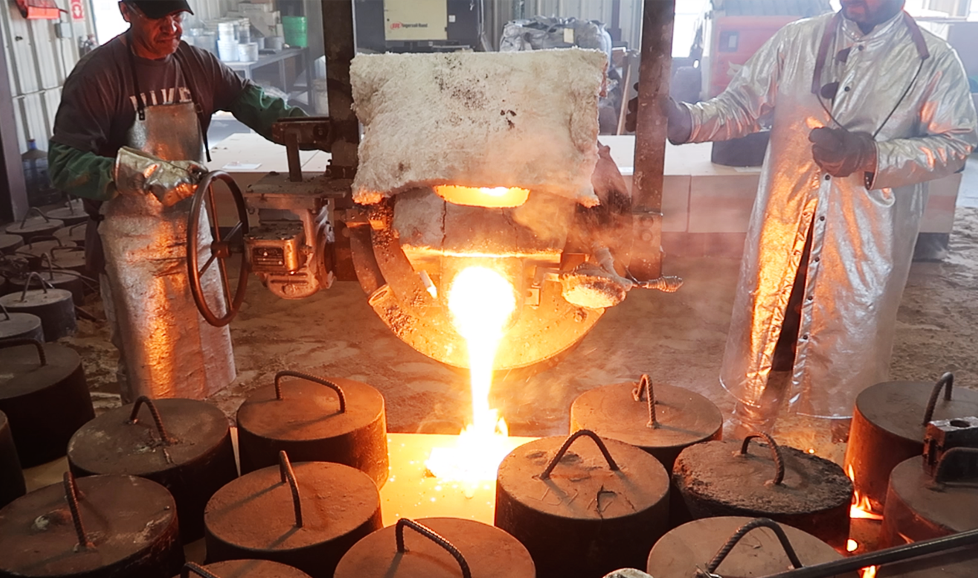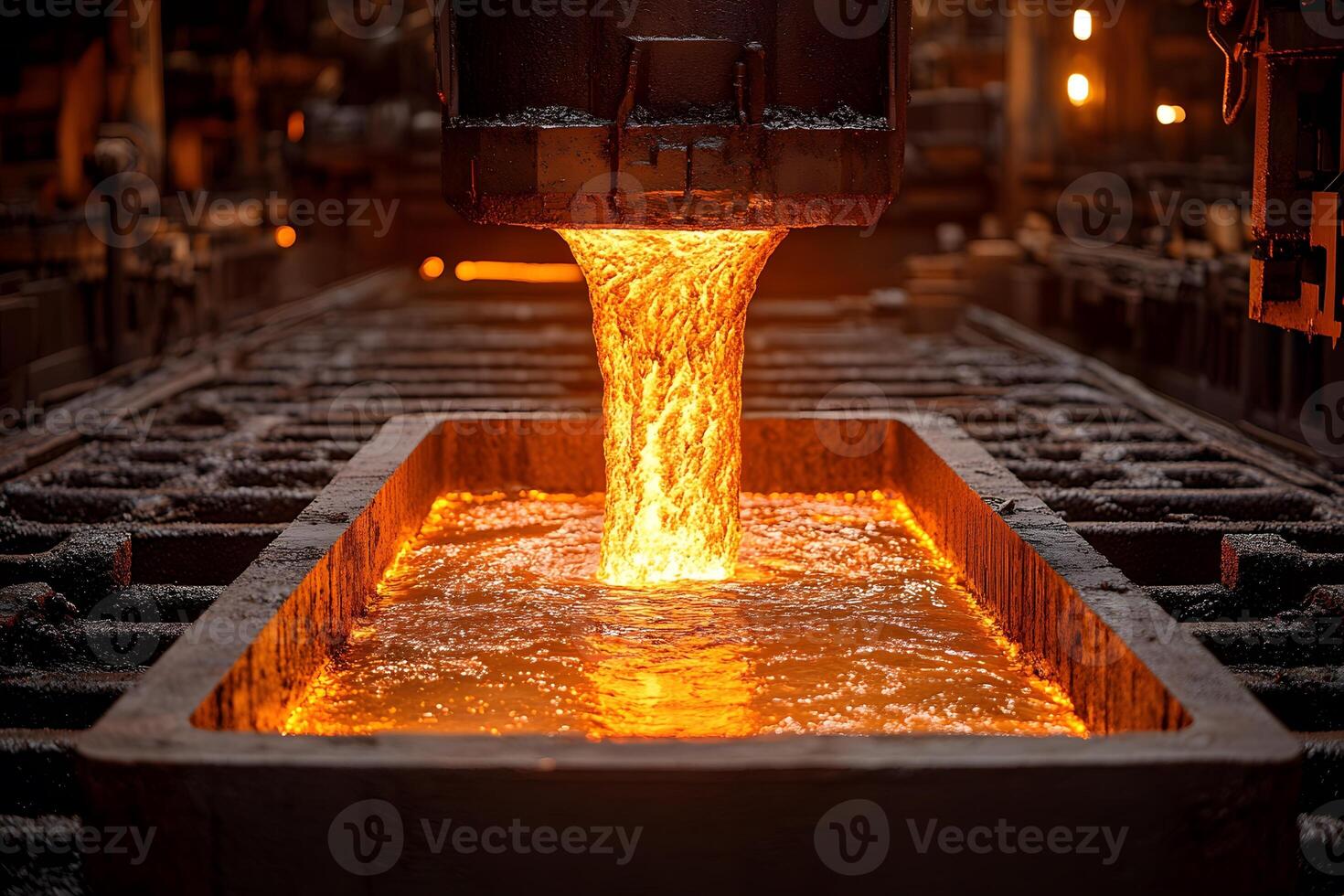Top Technological Advances Transforming the Metal Foundry Sector
Wiki Article
A Comprehensive Guide to Metal Casting: Benefits and Providers Used by Foundries
Metal casting is an essential process in numerous sectors, using various benefits via the services of shops. These facilities change molten metal right into accurate and durable parts, providing to specific client demands. By employing innovative technologies, factories guarantee high quality and performance in manufacturing. The ins and outs of metal casting and the diverse techniques included elevate important questions regarding its duty in modern manufacturing. What technologies exist ahead in this vital area?Understanding the Metal Casting Process
The metal casting procedure is a fundamental method used in producing to create complex shapes and components. This method involves putting molten metal into a mold designed to create the wanted things. The procedure begins with pattern creation, which acts as a template for the mold. Aluminum Foundry. Numerous materials, such as sand, metal, or ceramic, are used for mold-making, depending on the specific needs of the casting
As soon as the mold is prepared, molten metal is poured right into it and permitted to solidify and cool down. After solidification, the mold and mildew is eliminated, revealing the actors part. Numerous methods, consisting of sand casting, financial investment casting, and pass away casting, are utilized, each suited to various applications and materials. Quality control procedures, such as assessments and screening, are important to ensure the final product satisfies specs. Generally, the metal casting process plays a vital role in producing components for industries varying from vehicle to aerospace.
Key Conveniences of Metal Casting
Metal casting provides significant benefits that make it a preferred manufacturing technique in different sectors. Its style flexibility and precision permit for complex forms, while economical automation improves effectiveness. Furthermore, the flexibility and strength of products used in casting add to the durability of the last items.Style Adaptability and Precision
Releasing impressive design adaptability and accuracy, metal casting allows designers and designers to create elaborate forms and features that would be difficult or challenging to achieve with other making approaches. This capability allows the manufacturing of intricate geometries, internal structures, and great details that improve item capability and looks. In addition, various casting techniques, such as sand casting, investment casting, and die casting, supply additional alternatives for customization, fitting varied product residential properties and project demands. The flexibility of molds allows modifications during the design phase, improving the shift from concept to last product. Inevitably, metal casting stands out for its ability to deliver high-precision parts, making it an important process in industries ranging from auto to aerospace and beyond.Cost-Effective Automation
Cost-effective mass manufacturing stands as one of the key benefits of metal casting, allowing makers to create large quantities of parts at a lower price each. This efficiency arises from the capacity to develop complex molds that can be recycled multiple times, considerably minimizing arrangement and operational costs. Furthermore, metal casting processes, such as sand casting and pass away casting, enable high throughput, making it possible to meet the demands of large-scale production runs. The lowered product waste and energy consumption better improve cost financial savings, making metal casting an eye-catching choice for industries requiring mass components. On the whole, the cost-efficient nature of metal casting settings it as a preferred approach for producers intending for economic efficiency in their manufacturing processes.Product Versatility and Toughness
One of the standout features of metal casting is its amazing product adaptability, which permits using a large range of alloys and metals. This flexibility enables makers to select materials that ideal suit their certain applications, from light weight aluminum and bronze to iron and steel. Each metal provides one-of-a-kind buildings, including differing degrees of strength, rust resistance, and thermal conductivity. Subsequently, metal casting can produce elements that fulfill strict efficiency needs across diverse markets, such as auto, aerospace, and construction. Additionally, the strength of cast steels can be improved via various treatment processes, making sure durability and durability. Metal Foundry. Overall, the combination of material adaptability and intrinsic toughness makes metal casting a recommended selection for generating top quality componentsSorts Of Metal Casting Methods
Metal casting includes a variety of techniques that cater to different production requirements and material buildings. Usual approaches consist of sand casting, which uses a sand mold for complex shapes, and investment casting, known for its accuracy and surface area finish. Die casting is another technique that uses high-pressure shot of liquified metal into molds, ideal for automation of tiny components.Shell molding provides a faster different, making use of a resin-coated sand to produce thin-walled molds, while shed foam casting allows for elaborate designs without the demand for a core.
Additionally, continuous casting is utilized for generating lengthy sections of metal, such as bars or sheets, by strengthening liquified metal in a continual process. Each method offers distinct benefits and is chosen based on variables like the needed information, production quantity, and material kind, making sure exceptional results in metal fabrication across various sectors.
The Function of Foundries in Metal Casting
Shops play a crucial function in the metal casting procedure, acting as the facilities where liquified metal is transformed right into finished items. These specialized establishments are outfitted with the required devices and innovations to take care of various steels, ensuring high-grade results. Shops are accountable for numerous crucial features, consisting of melting the metal, putting it right into molds, and enabling it to strengthen.Additionally, they preserve rigorous safety and environmental criteria to protect employees and decrease environmental influence. Competent professionals and engineers work together to enhance casting procedures, enhancing effectiveness and lowering waste. Foundries likewise involve in quality assurance actions, ensuring that the end products satisfy certain resistances and requirements. This quality control is important for markets that depend on specific parts, such as auto and aerospace. Because of this, foundries contribute considerably to the overall manufacturing landscape, allowing advancement and development across different industries.
Custom-made Metal Casting Solutions
Custom-made metal casting services provide tailored style services that satisfy certain client demands. These services also provide product option competence, making sure the ideal metal is selected for the preferred application. Such flexibility and knowledge enhance the total top quality and efficiency of the end product.
Tailored Layout Solutions
Tailored style solutions in metal casting supply manufacturers with the versatility to develop components that satisfy specific performance and visual demands. Shops offer personalized solutions that allow customers to specify dimensions, forms, and find more surface area coatings to attain desired end results. This personalization procedure frequently consists of cooperation between engineers and designers, making certain that the final items align with functional needs and market criteria. Advanced innovations, such as computer-aided layout (CAD) and simulation software, enable accurate modeling and screening of parts prior to manufacturing, reducing errors and improving performance. By leveraging tailored style remedies, organizations can optimize functionality while decreasing waste and expenses, eventually leading to a more competitive edge out there. This versatility is necessary for markets needing special applications and specs.Material Choice Experience
When choosing products for metal casting, competence plays a necessary function in making sure that the best option aligns with both efficiency needs and cost-effectiveness. Factories utilize experienced professionals who understand the properties of various steels and alloys, allowing them to suggest perfect products for details applications. Variables such as strength, rust resistance, and thermal conductivity are carefully considered to satisfy the client's requirements. Additionally, sector patterns and advancements in material science inform these choices, allowing shops to remain competitive. By leveraging their knowledge, foundries can help clients in guiding through complicated material choices, ultimately bring about enhanced item quality and lowered production prices. This specialized expertise is important for attaining successful end results in customized metal casting solutions.Quality Assurance in Metal Casting
Quality assurance in metal casting is crucial to ensure that the end products satisfy the required specs and efficiency standards. click to find out more Shops employ a range of methods and strategies to assure the best quality of cast elements. This procedure starts with rigid product inspections, validating that resources follow market requirements. Throughout the casting procedure, real-time surveillance and testing are conducted to examine criteria such as temperature, mold and mildew honesty, and dimensional accuracy.
Applications of Metal Castings Across Industries
Metal spreadings play an important duty in different industries, offering as the backbone for countless applications. In the automotive field, cast parts such as engine blocks and transmission real estates are essential for lorry performance and reliability. The aerospace market depends on precision castings for important parts that assure safety and performance in flight. Additionally, the construction sector utilizes metal castings for components, installations, and architectural components, improving the resilience of structures and infrastructure.Moreover, the power industry advantages from spreadings used in wind turbine blades and various other tools important for power generation - Aluminum Foundry. The medical area additionally makes use of metal spreadings in instruments and gadgets, demonstrating the adaptability of this production procedure. On the whole, metal castings are integral to the performance and improvement of varied markets, showcasing their relevance in modern-day innovation and framework development
Frequently Asked Questions
What Products Are Commonly Used in Metal Casting?
Common materials made use of in metal casting consist of light weight aluminum, iron, steel, brass, and bronze. Each material offers unique homes appropriate for various applications, allowing suppliers to pick the very best alternative based upon weight, deterioration, and stamina resistance.How much time Does the Metal Casting Refine Generally Take?
The metal casting process typically takes numerous hours to a few days, depending on variables such as the intricacy of the design, kind of metal utilized, and the particular casting method used by the factory.
What Is the Environmental Effect of Metal Casting?
The environmental influence of metal casting includes power usage, exhausts, and waste generation. Factories frequently apply procedures to mitigate these results, such as recycling products and using cleaner modern technologies to minimize their ecological footprint.Can Metal Casting Be Provided For Small-Scale Projects?
Metal casting can certainly be executed for small-scale tasks. Various shops deal with such demands, providing tailored services that suit limited manufacturing runs while keeping quality and accuracy in visit the website the end products.What Are the Precaution in Metal Casting Foundries?
In metal casting factories, precaution consist of personal safety tools, proper ventilation, training on devices usage, emergency procedures, routine upkeep checks, and adherence to industry safety requirements to decrease risks related to liquified metal and unsafe materials.Additionally, metal casting processes, such as sand casting and pass away casting, permit for high throughput, making it feasible to meet the demands of massive manufacturing runs. One of the standout features of metal casting is its remarkable material convenience, which permits for the usage of a wide range of alloys and metals. Furthermore, constant casting is used for creating lengthy areas of metal, such as sheets or bars, by strengthening liquified metal in a continual procedure. Factories play a crucial duty in the metal casting process, serving as the facilities where molten metal is transformed into completed products. Common materials used in metal casting consist of light weight aluminum, iron, bronze, brass, and steel.
Report this wiki page